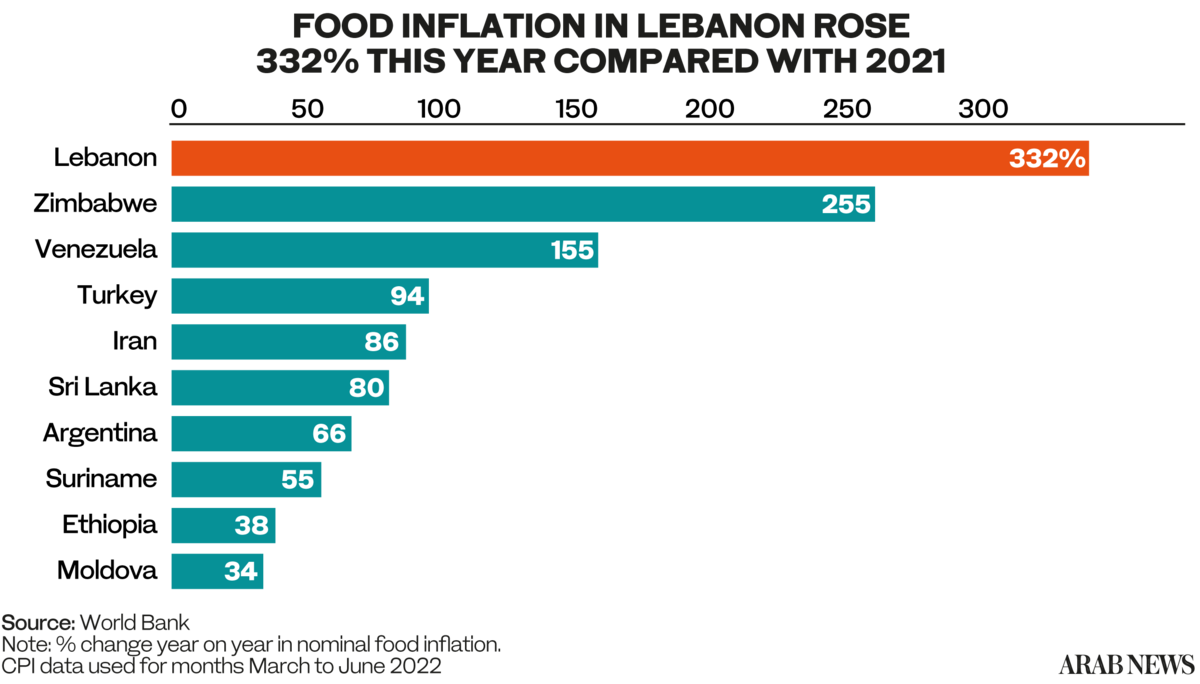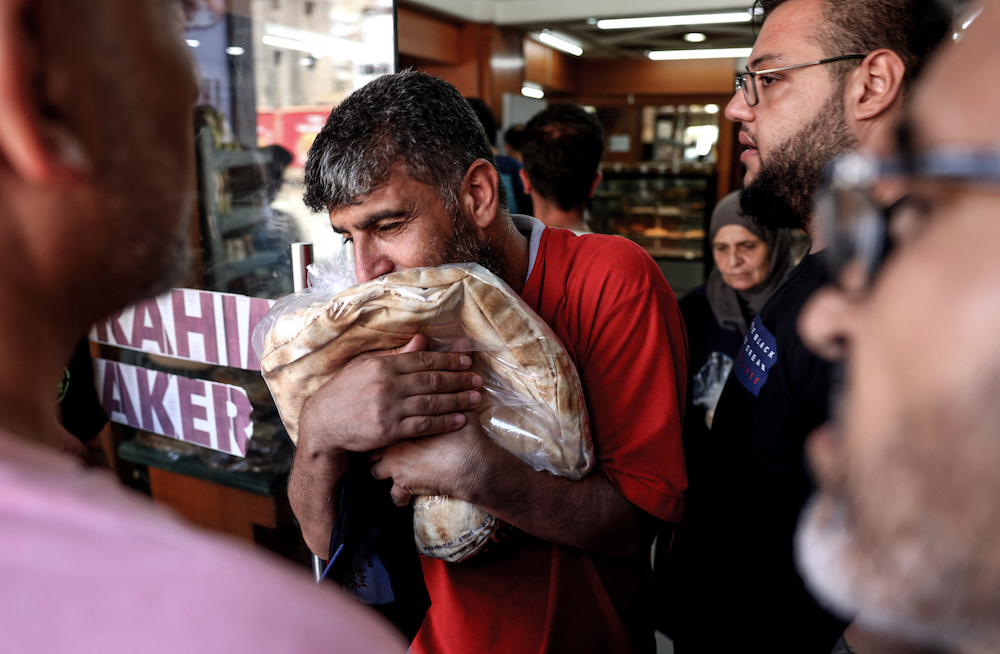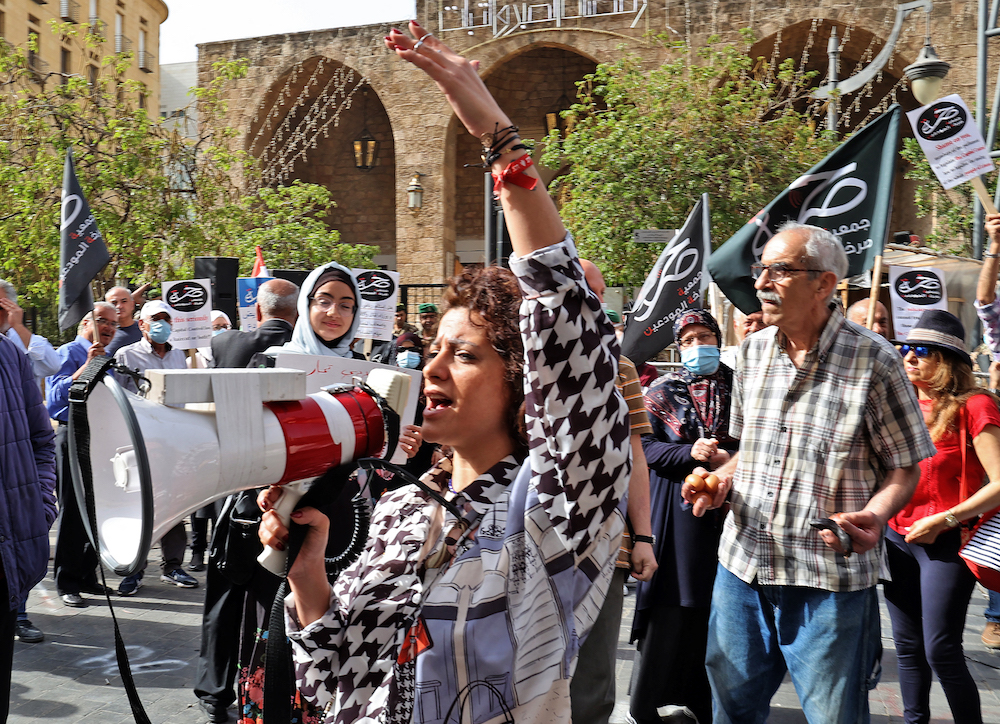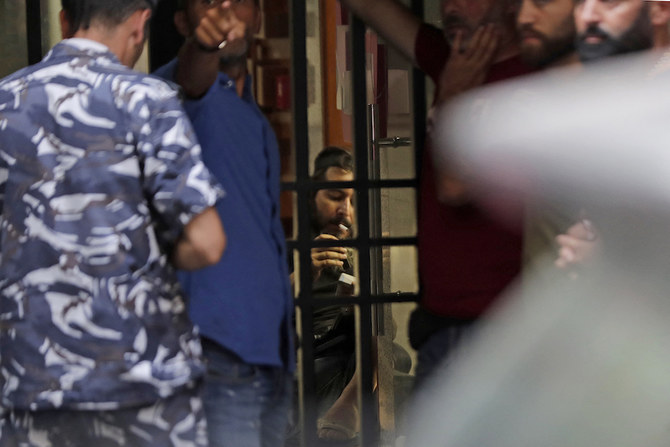BEIRUT: The news that Lebanon’s attorney general on Tuesday released a man who stormed a bank in Beirut last week and took hostages would have scandalized the public in most countries. But Bassam Hussein was no ordinary hostage-taker and Lebanon is no ordinary country.
Hussein had reportedly held bank employees and customers at gunpoint on August 11 to demand his own money back. According to the National News Agency of Lebanon, when his request to withdraw part of his frozen savings of $210,000 to cover medical bills for his ailing father was denied, he threatened to torch the bank and kill everyone in it.
The attorney general’s decision came after the Federal Bank dropped its lawsuit against Hussein, who emerged as a national hero in a country where banks have subjected their customers to all manner of restrictions, including strict limits on savings withdrawals.
Hussein had targeted a bank but his act of desperation was viewed by many of his compatriots as emblematic of a much bigger rot.

Lebanon, a nation once described as the “Switzerland of the Middle East,” the darling of foreign investors, artists and intellectuals, has been reduced to a perpetually failing state, with the dubious honor of having an inflation rate that crossed the 200 percent mark this year.
Last week, The New York Times published a story comparing the rising inflation rate in the US — currently at 9 percent — to Argentina’s 90 percent. This is a country that in the 1980s saw its rate hit an “unbelievable” 3,000 percent. Citizens of the South American nation struggle to cope, using cash to pay for everything from buildings to coffee and store their money everywhere but the bank, the newspaper reported.
Similar to Argentina, Lebanon’s once-welcoming banks with revolving glass doors are now fortified with heavy metal and barbed wire for security, all of which are spray painted over with angry graffiti of desperate people denied access to their savings.
The crippling financial crisis that began in 2019, accompanied by a rapid devaluation of the national currency and runaway inflation, has pushed an unprecedented number of families in Lebanon below the poverty line.

Bread is one of the few subsidized food items in the country. (AFP)
An embodiment of this tragedy is Rachelle, a widow with a special-needs son, whose husband committed suicide two years ago following a long history of family quarrels over large sums of money lost as Lebanon’s economy unraveled.
Rachelle, a resident of Jounieh who did not want to give her last name, can only withdraw a maximum of $400 per month from her bank account. She is one of millions of Lebanese who cannot freely access their savings, because the funds were used by banks to pay unreasonably high interest rates to attract more deposits.
The banking crisis had an immediate effect on the Lebanese lira. The shortage of dollars in the currency market, the country defaulting on its Eurobond debt, and the resulting loss of faith in the stability of the local currency all contributed to the rapid devaluation of the lira.
The Lebanese currency has lost more than 90 percent of its value since 2019. As a result, people’s purchasing power has plummeted, multiple types of goods have disappeared from the shelves, prices have skyrocketed, and the country has been declared a “hunger” hotspot.
Almost 80 percent of the Lebanese population is now considered to be living below the poverty line after the imposition of informal capital controls.
INNUMBERS
* 6.7m Population in 2021.
* -.08% Annual population growth (2021).
* 150k Net migration (2017)
Source: World Bank
A recent World Bank report labeled the financial meltdown as “deliberate” and one of the worst economic crises in modern times.
Rachelle now survives on small amounts of money sent by her family and in-laws from abroad, in addition to food stamps and parcels distributed by local NGOs.
“I cannot pay my bills; I live in constant fear and anxiety that I will be thrown out of my house. I have diabetes and I am close to giving up altogether as I can barely afford my medication,” she told Arab News.
Like her, millions of Lebanese are unable these days to buy medicines, which are entirely imported from abroad, leading to spikes in prices every time the lira depreciates.
Lebanon has been plagued by corruption for decades, a situation that benefits those well connected to the political elite at the expense of everyone else. The 2019 economic meltdown resulted in the near total disappearance of the middle class — who have now become the working poor.
“Before the crisis, we had some kind of a middle class. The result of the inflation led to a lot of people becoming poor or falling under the poverty line,” Mohamad Faour, a professor of finance at the American University of Beirut, told Arab News.
“Whatever was in the middle has ceased to exist,” he said, referring to the deepening economic inequality in Lebanon. “We have a new class of nouveau riche whose income is in dollars, but even their condition is not quite stable.”

Protesters march against Lebanon's draft capital control law in April this year. (AFP)
The problem of sky-high inflation is compounded by a fluctuating currency exchange rate, which can go from 20,000 lira to one dollar to 30,000 in one week, making financial planning impossible.
To make matters worse, even when the lira appreciates — mostly due to dollar injections into the market by the central bank — prices rarely go down.
Elie, an unemployed Lebanese university graduate who lives in Beirut, told Arab News: “I’ve somewhat become used to uncontrollable price changes, and ever since the crisis began, I’ve started compromising with several things and checking prices of any item I buy.”
He added: “What still surprises me is that there is absolutely no price control, and the same item on the same day can be found with several drastically different prices in different shops.”
Faour says this anomaly is a legitimate grievance, but explains that it is not unique to Lebanon. “This happens to all countries facing currency (crises),” he told Arab News.

Lebanon, a nation once described as the “Switzerland of the Middle East,” the darling of foreign investors, artists and intellectuals, has been reduced to a perpetually failing state. (AFP)
“The value of goods and currency are based on expectations and in Lebanon the situation is chaotic and the general sentiment is negative. But we also can’t neglect the big exploitative element of many importers who are profiting off margins due to uncertainty.”
Political and bureaucratic mismanagement and inaction are seen as contributing factors in the runaway inflation. Faour says reasonable reforms proposed by the International Monetary Fund have inevitably been sabotaged by politically connected bankers and politicians.
All the traditional parties and politicians ruling Lebanon have played a role in leading the country into the abyss, he says.
“You have a power-sharing agreement that isn’t enabling any decision-making. We have to address the problems head-on, which is very hard because it means facing off with the bank owners who will be taking a big part of the hit due to their reckless lending decisions,” he said.
“We have to be able to tell depositors what they’ve lost and what they can still have. We need a safety net to make the descent less painful. The stabilization, unfortunately, will entail unpopular decisions.”
While the volume of the Lebanese lira in the market has increased significantly since the beginning of the financial crisis, this is not what is at the heart of the problem, according to Faour.

An all too familiar sight in Lebanon, as people wait for hours in cars to get fuel at a gas station in Zalka. (AFP file photo)
“Public misconception is that inflation is because the government is printing too much money, but that’s not the case,” he told Arab News.
“It’s the result of the exchange rate collapse and the government fiscal policy which has been characterized by austerity.”
Pointing out that “public salaries are still at the original 1,500 lira rate,” he said. “The government is actually not spending enough money; the fiscal deficit has dropped dramatically.”
To the people of Lebanon, this abrupt economic decline means more than just numbers on a graph. The growing inability to secure even their basic needs has taken its toll on the mental health of the Lebanese.
“People around are, at least partly, in clear denial,” Elie, the unemployed graduate, told Arab News, speaking philosophically.
“Everybody right now would say that they have become used to the dramatic changes of everyday life compared with just a few years ago and that ‘it could have been worse.’
“But deep down they know that it really couldn’t, that all aspects of life at times appear unbearable and psychologically exhausting.”
















